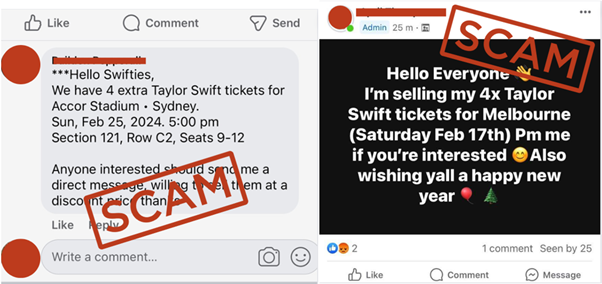Taylor Swift fans looking to secure last minute tickets to the Australian leg of The Eras Tour are being urged to be cautious of scammers selling fake tickets on social media.
The National Anti-Scam Centre's warning follows a recent spike in reports of scammers compromising social media accounts to sell fake Taylor Swift tickets to the hacked account's friends list.
"The Eras Tour is the hottest ticket in town this summer and scammers are seizing the opportunity to dupe Australian Swifties looking to buy resale tickets," ACCC Deputy Chair Catriona Lowe said.
"This scam is a low act, seeking to take advantage of fans, many of whom are young and are desperately trying to secure a ticket to make their dream of seeing Taylor Swift live come true."
Scamwatch has already received 273 reports of people being scammed buying Taylor Swift The Eras Tour tickets via social media since tickets went on sale in Australia in June 2023. Australians have lost over $135,000 to this scam so far, with this figure likely to continue to rise. Reports are most prevalent in New South Wales (114 reports, $54,645 lost) and Victoria (96 reports, $53,607 lost), where the superstar is performing.
"We are working with law enforcement and social media platforms to combat these scams but are concerned that scam activity is only going to increase in the lead-up to Taylor Swift's arrival in Australia in mid-February," Ms Lowe said.
"We are urging fans to be alert to scammers and think twice before seeking to buy a ticket on social media, even if it's from a friend or community page you trust."
"Be mindful that scammers have been hacking genuine accounts to appear legitimate and are tricking trusting friends or connections into buying Taylor Swift tickets that don't exist."
"The safest way to get legitimate tickets to The Eras Tour is by purchasing tickets from the authorised reseller, Ticketek Marketplace," Ms Lowe said.
How the scam works
- You're contacted by a friend on social media or see a post by a friend or someone you know and trust on a community page selling tickets to a Taylor Swift concert.
- The social media post or message includes a story about why the person can't go to the concert and is offering to sell the tickets "at cost".
- The scammer may ask you to pay an additional fee related to changing the ticket to your name.
- Scammers may try and rush you to purchase the tickets and transfer money by referring to the high demand for the tickets.
- Once paid for, you're left without the ticket to the concert and no further contact, only to find out that your friend or acquaintance's social media profile has been hacked.

Top tips to avoid a scam
- The safest course is to buy tickets from an authorised ticket seller.
- If you are considering an offer on social media (and we don't advise you do) - do your research. Independently contact your friend - via a different channel - and check it's legit.
- Always look for secure payment options such as PayPal or Apple/Google Pay rather than providing your credit card details to the seller.
- Be alert to the fact that scams exist.
Stop - take your time before giving money or personal information. Scammers will create a sense of urgency - they might even tell you they have other interested buyers. Don't rush to act.
Think - ask yourself if you really know who you are communicating with? Could the social media post or message be fake? Could your friends account be hacked?
Protect - act quickly if something feels wrong. Contact your bank and help others by reporting scams to Scamwatch.
What to do if you have been scammed
- If you have lost money, contact your bank or financial institution as soon as possible.
- Contact the platform on which you were scammed and inform them of the circumstances surrounding the scam.
- Help others by reporting scams to Scamwatch
- Tell your friends and family, it helps to share your experience - they can offer support and you can help protect them from scams.






